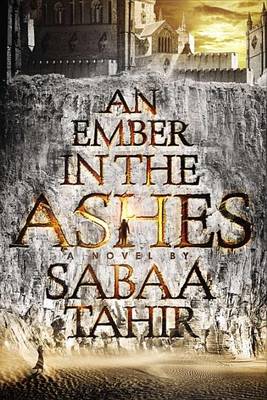Reviewed by nannah on
Book content warnings:
rape mention
violence against women
Laia's plot:
Laia and her family are Scholars, members of a people conquered by the Empire. When Laia's brother is suspected of being involved with the Resistance against the Empire, her family is killed, her brother is imprisoned. Laia manages to escape and find the Resistance. She makes a deal with them and will spy on the Commandant of the Empire's military academy as a slave in return for their help to free her brother.
Elias's plot:
Elias is a member of the Empire's military academy, and he's also the bastard son of the ruthless Commandant. He's one of the best, which makes him part of the academy's Trials to determine the new Emperor. It'd be an honor, except all he wants to do is run far away from the Empire and its cruelty.
I'm not sure what the overall plot is, except survive, survive, survive. This book is cruel. And complicated. There's almost way too many things going on at once, with too many side plots, too many characters, too much action. I think I remember one scene where the pace relaxed, but save for that chapter, everything is go, go! And despite all this, it's engrossing and readable.
I think much to do with the book's irresistibility are the characters themselves. Beyond the love story (which borders on ridiculous and takes up a little too much page time in my opinion), these characters are so realistic and well-created. All the main and secondary characters have their own agenda, beliefs, motivators, etc. It's so believable that they're their own minds, not concocted by one.
But that love story. Laia likes redheaded guy, but she also likes Elias. Now Elias has a deep connection with his childhood friend Helene, who is in love with him, but he likes Laia, so this is some strange love rectangle-like shaped disaster. Don't get me wrong, some people might love this sort of thing! I avoid it when I can.
Speaking of things that make me uncomfortable . . .
The Augurs have almost a too massive hand in the plot here. An Augur is a religious official (from ancient Rome - the place/time this book is based on) who interprets God's will from observing nature. In this book, there are fourteen Augurs, and they control everything. The characters make decisions, but then it's revealed it was foreseen/controlled/made to happen by the Augurs. So . . . are the characters really proactive, or is everything in this book orchestrated by these Augurs? I'm really not sure how I feel about all this.
There are just things that don't seem to make sense, or aren't fully resolved, and it makes me so frustrated, because I want to like the book so bad!
- when Laia goes undercover as a slave, how is it that she's able to keep her mother's armband?
- the matter of the Nightbringer, who was almost never mentioned after his first scene
- Helene's "secret talent"
- the ENDING. I sooooo get frustrated at first novels that don't have an ending. at least a sort of ending. when nothing resolves, there's no satisfaction!
((also I'm so, so tired of worlds so sexist and unsafe for women))
I mean, I moan about stuff, but I'll still probably read and buy all the books!
Reading updates
- Started reading
- 4 March, 2016: Finished reading
- 4 March, 2016: Reviewed
